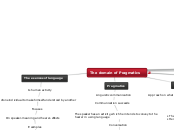The domain of Pragmatics
The esences of language
Is human activity
Part of one individual to make himself understood by another
Focuses
On speaker-meaning and hearer-effects
Examples
How are you? Counts as greetings, not a farewell
Say something
Approach on what a speaker has said and besides ask the question
Determine
• The sense of the uttered
• He identity of objects in the real world reference to by the speaker
Example
Smoking children
The statements
Are not directly addressed to the other
Example
It´s too cold in here”
Statements are directly addressed the other
Expressing your needs
Directly asked
Example
• would you please Close the window?
• Would you plese Lend me a pen?
Mitigating divices
Pragmatics
Linguistic communication
Communication succeeds
The speaker has an activity, which he intends to convey to the hearer in using language
Conversation
Studies the organization of conversations and suggests
Elements
• Opening, closing, responses, explanations, classifications
Purpose
They communicate a proposal to engage in conversation
Speech act
It`s center to work of researchers in conversation
Types
The can be made on the basic structure
Structural form
Subtopic
• Declarative
• Interrogative
• Imperative
Example
• You wear a seat bell “declarative”
• Do you wear a seat bell “interrogative?”
• Wear a seat bell “imperative”
Illocutionary acts
A complete speech act made in a typical utterance
Consists
In the delivery of the propositional l content of the utterance
Example
• I`ll see you later
• I promise you that
Prelocutionary acts
A speech act that produce and effect
Speaker
Intended or not achieve in an addressee by an utterances
Utterances
Depending on the circumstances you will assumption that hearer will recognize the effect intended for
Example
I warn you that
Locutionary acts
Performance of an utterance and hence of speech acts
Producing
A meaningful linguistic expression “senses”
I`ve just made some coffee
